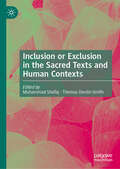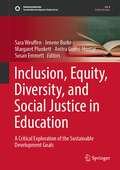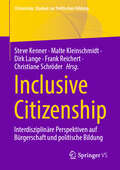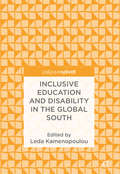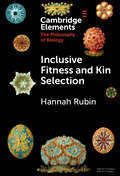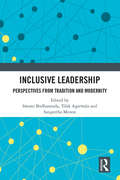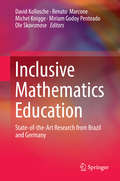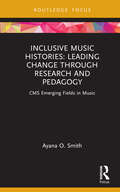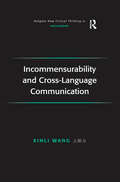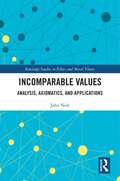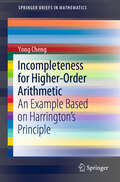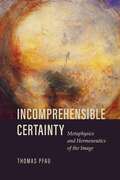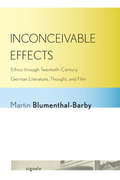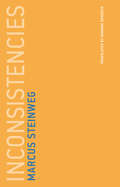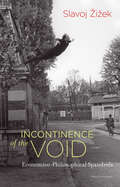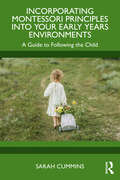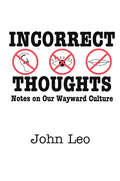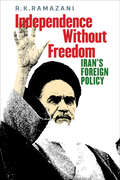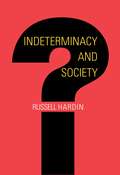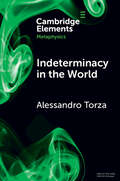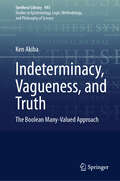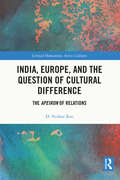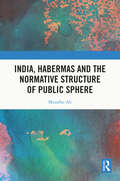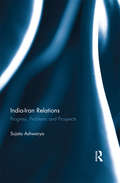- Table View
- List View
Inclusion or Exclusion in the Sacred Texts and Human Contexts
by Muhammad Shafiq Thomas Donlin-SmithThis work delves into the fundamental issue of Otherness, from both sacred texts and communal experiences. While the title adopts the dyad of “inclusion” or “exclusion”, these analyses broadly reflect nuanced critical considerations. Filled with profound psychological, theological, sociological, anthropological, and ethical dimensions, experiencing the Other is richly expressed within religious traditions. This book is a must for scholars interested in a multi-disciplinary approach to inclusivity and religion.
Inclusion, Equity, Diversity, and Social Justice in Education: A Critical Exploration of the Sustainable Development Goals (Sustainable Development Goals Series)
by Margaret Plunkett Jenene Burke Sara Weuffen Anitra Goriss-Hunter Susan EmmettThis book presents an edited collection of critical discourse situated in the fields of diversity and inclusion broadly, and more specifically, within the discipline of education. Each chapter articulates the importance of educational diversity in achieving the United Nations Sustainable Development Goal 4. The edited collection presents a grounding narrative of equitable learning opportunities and experiences via interpretivist theoretical frameworks and student-centered methodologies. The combination of these approaches, combined within the strong and scholarly-informed social justice lens, reminds us, that the onus of education is to acknowledge, recognise, respect, and engage with the diverse student cohorts, learning needs, and multiple knowledges and cultures that exist in educational contexts. This edited collection creates a holistic discourse around the experiences, interrogations, and innovations occurring within education communities to foreground deeper and more holistic understanding of the intersectionality of diversity and inclusion existing within the contemporary educational settings.
Inclusive Citizenship: Interdisziplinäre Perspektiven auf Bürgerschaft und politische Bildung (Citizenship. Studien zur Politischen Bildung)
by Dirk Lange Malte Kleinschmidt Frank Reichert Steve Kenner Christiane SchröderInclusive Citizenship ist ein Konzept, das in diesem Band theoretisch und empirisch in den Blick genommen wird. Die Autor*innen betrachten Citizenship und Inklusion als soziale Praktiken aus verschiedenen Perspektiven und in verschiedenen gesellschaftlichen Feldern wie Gender und Migration, Lernen und Bildung, Digitalisierung, Medizin und Kulturerbe. Anhand von vielen empirischen Beispielen und theoretischen Impulsen wird so das Konzept geschärft, mit dem die inkludierenden und exkludierenden Aspekte von Citizenship ebenso in den Blick kommen wie die Dimensionen Status und Performativität.
Inclusive Education and Disability in the Global South
by Leda KamenopoulouThis edited volume examines inclusive education and disability in the global South. Presenting four qualitative research studies conducted in Malaysia, Bhutan, Philippines and Belize, the authors examine the implementation of inclusive education and disabled children’s participation in the education system: contexts on which very little is known. Thus, this book provides a unique opportunity to access rare context-specific information concerning this region of the world; and to reflect on the particular challenges some countries face in the realization of full participation of all children within education. Authored by researchers who are also teaching professionals with experience and understanding of the complexities of the real world, this book reminds us that researchers and policy makers must listen to all voices and perspectives: especially those that have remained silenced and ignored.
Inclusive Fitness and Kin Selection (Elements in the Philosophy of Biology)
by Hannah RubinThe biological world is full of phenomena that seem to run counter to Darwin's insight that natural selection can lead to the appearance of design. For instance, why do organisms in some species divide reproductive labor? The existence of non-reproducing organisms in such 'eusocial' species looks to be at odds with an evolutionary theory which posits traits exist because they help organisms survive and reproduce. What is the evolutionary advantage of an insect being distasteful to its predators? The distastefulness appears designed to deter predators, but can only affect the predator's actions when the insect is eaten; it is hard to see how such a trait could be passed on. This Element will cover the shared foundations of evolutionary explanations for these and other seemingly puzzling phenomena, focusing on the concepts of inclusive fitness and kin selection.
Inclusive Leadership: Perspectiives from Tradition and Modernity
by Sangeetha Menon Swami Bodhananda Tilak AgerwalaThis book reflects on the models of leadership espoused by ancient Indic traditions, in particular the Advaita Vedanta tradition. Focusing primarily on the Rajarshi – ‘the philosopher king’ – the essays in this volume showcase how using these models in contemporary society could lead to the creation of self-aware and empathic leaders and an inclusive society. The book explores examples of the Brahmarshi, or the wise scholar; Rajarshi, or the wise ruler; and Devarshi, or the visionary, to bring together all the ideal virtues of inclusive leadership in the current cultural and political space. The essays in the volume adopt a critical sociological, philosophical and management lens to analyse Indic traditions and dharmic concepts. The volume uses concepts such as dharma, karma and, yoga along with organisational psychology, technology, and management, to arrive at the concept of transcendental leadership. It theorises new definitions of the Rajarshi ideal, which can be used towards public service, social transformation and self-discovery. The volume will be useful for scholars and academics interested in Indic philosophies of leadership and governance, sociology, and social and political inclusivity. It will also be useful for readers in public administration, business and management.
Inclusive Mathematics Education: State-of-the-Art Research from Brazil and Germany
by Ole Skovsmose David Kollosche Renato Marcone Michel Knigge Miriam Godoy PenteadoThe book provides an overview of state-of-the-art research from Brazil and Germany in the field of inclusive mathematics education. Originated from a research cooperation between two countries where inclusive education in mathematics has been a major challenge, this volume seeks to make recent research findings available to the international community of mathematics teachers and researchers. In the book, the authors cover a wide variety of special needs that learners of mathematics may have in inclusive settings. They present theoretical frameworks and methodological approaches for research and practice.
Inclusive Music Histories: CMS Emerging Fields in Music (CMS Emerging Fields in Music)
by Ayana O. SmithInclusive Music Histories: Leading Change through Research and Pedagogy models effective practices for researchers and instructors striving either to reform music history curricula at large or update individual topics within their classes to be more inclusive. Confronting racial and other imbalances of Western music history, the author develops four core principles that enable a shift in thinking to create a truly intersectional music history narrative and provides case studies that can be directly applied in the classroom. The book addresses inclusivity issues in the discipline of musicology by outlining imbalances encoded into the canonic repertory, pedagogy, and historiography of the field. This book offers comprehensive teaching tools that instructors can use at all stages of course design, from syllabus writing and lecture planning to discussion techniques, with assignments for each of the subject matter case studies. Inclusive Music Histories enables instructors to go beyond token representation to a more nuanced music history pedagogy.
Inclusive Music Histories: CMS Emerging Fields in Music (CMS Emerging Fields in Music)
by Ayana O. SmithInclusive Music Histories: Leading Change through Research and Pedagogy models effective practices for researchers and instructors striving either to reform music history curricula at large or update individual topics within their classes to be more inclusive. Confronting racial and other imbalances of Western music history, the author develops four core principles that enable a shift in thinking to create a truly intersectional music history narrative and provides case studies that can be directly applied in the classroom. The book addresses inclusivity issues in the discipline of musicology by outlining imbalances encoded into the canonic repertory, pedagogy, and historiography of the field. This book offers comprehensive teaching tools that instructors can use at all stages of course design, from syllabus writing and lecture planning to discussion techniques, with assignments for each of the subject matter case studies. Inclusive Music Histories enables instructors to go beyond token representation to a more nuanced music history pedagogy.
Incommensurability and Cross-Language Communication (Ashgate New Critical Thinking in Philosophy)
by Xinli WangA dominant epistemological assumption behind Western philosophy is that it is possible to locate some form of commonality between languages, traditions, or cultures - such as a common language or lexicon, or a common notion of rationality - which makes full linguistic communication between them always attainable. Xinli Wang argues that the thesis of incommensurability challenges this assumption by exploring why and how linguistic communication between two conceptually disparate languages, traditions, or cultures is often problematic and even unattainable. According to Wang's presuppositional interpretation of incommensurability, the real secret of incommensurability lies in the ontological set-ups of two competing presuppositional languages. This book provides many original contributions to the discussion of incommensurability and related issues in philosophy and offers valuable insights to scholars in other fields, such as anthropology, communication, linguistics, scientific education, and cultural studies.
Incomparable Values: Analysis, Axiomatics and Applications (Routledge Studies in Ethics and Moral Theory)
by John NoltPeople tend to rank values of all kinds linearly from good to bad, but there is little reason to think that this is reasonable or correct. This book argues, to the contrary, that values are often partially ordered and hence frequently incomparable. Proceeding logically from a small set of axioms, John Nolt examines the great variety of partially ordered value structures, exposing fallacies that arise from overlooking them. He reveals various ways in which incomparability is obscured: using linear indices to summarize partially ordered data, relying on an inadequately defined concept of parity, or conflating incomparability with vagueness. Incomparability can enrich and clarify a range of topics including the paradoxes of Derek Parfit, rational decision theory, and the infinite values of theology. Finally, Nolt shows how to generalize many of the concepts introduced earlier, explores the intricate depths of certain noteworthy partially ordered value structures, and argues for the finitude of value. Incomparable Values will be of interest to scholars and advanced students working in ethics, value theory, rational decision theory, and logic.
Incompleteness for Higher-Order Arithmetic: An Example Based on Harrington’s Principle (SpringerBriefs in Mathematics)
by Yong ChengGödel's true-but-unprovable sentence from the first incompleteness theorem is purely logical in nature, i.e. not mathematically natural or interesting. An interesting problem is to find mathematically natural and interesting statements that are similarly unprovable. A lot of research has since been done in this direction, most notably by Harvey Friedman. A lot of examples of concrete incompleteness with real mathematical content have been found to date. This brief contributes to Harvey Friedman's research program on concrete incompleteness for higher-order arithmetic and gives a specific example of concrete mathematical theorems which is expressible in second-order arithmetic but the minimal system in higher-order arithmetic to prove it is fourth-order arithmetic.This book first examines the following foundational question: are all theorems in classic mathematics expressible in second-order arithmetic provable in second-order arithmetic? The author gives a counterexample for this question and isolates this counterexample from the Martin-Harrington Theorem in set theory. It shows that the statement “Harrington's principle implies zero sharp" is not provable in second-order arithmetic. This book further examines what is the minimal system in higher-order arithmetic to prove the theorem “Harrington's principle implies zero sharp" and shows that it is neither provable in second-order arithmetic or third-order arithmetic, but provable in fourth-order arithmetic. The book also examines the large cardinal strength of Harrington's principle and its strengthening over second-order arithmetic and third-order arithmetic.
Incomprehensible Certainty: Metaphysics and Hermeneutics of the Image
by Thomas PfauThomas Pfau’s study of images and visual experience is a tour de force linking Platonic metaphysics to modern phenomenology and probing literary, philosophical, and theological accounts of visual experience from Plato to Rilke. <p><p> Incomprehensible Certainty presents a sustained reflection on the nature of images and the phenomenology of visual experience. Taking the “image” (eikōn) as the essential medium of art and literature and as foundational for the intuitive ways in which we make contact with our “lifeworld,” Thomas Pfau draws in equal measure on Platonic metaphysics and modern phenomenology to advance a series of interlocking claims. <p><p>First, Pfau shows that, beginning with Plato’s later dialogues, being and appearance came to be understood as ontologically distinct from (but no longer opposed to) one another. Second, in contrast to the idol that is typically gazed at and visually consumed as an object of desire, this study positions the image as a medium whose intrinsic abundance and excess reveal to us its metaphysical function―namely, as the visible analogue of an invisible, numinous reality. Finally, the interpretations unfolded in this book (from Plato, Plotinus, Pseudo-Dionysius, John Damascene via Bernard of Clairvaux, Bonaventure, Julian of Norwich, and Nicholas of Cusa to modern writers and artists such as Goethe, Ruskin, Turner, Hopkins, Cézanne, and Rilke) affirm the essential complementarity of image and word, visual intuition and hermeneutic practice, in theology, philosophy, and literature. <p><p>Like Pfau’s previous book, Minding the Modern, Incomprehensible Certainty is a major work. With over fifty illustrations, the book will interest students and scholars of philosophy, theology, literature, and art history.
Inconceivable Effects
by Martin Blumenthal-BarbyIn Inconceivable Effects, Martin Blumenthal-Barby reads theoretical, literary and cinematic works that appear noteworthy for the ethical questions they raise. Via critical analysis of writers and filmmakers whose projects have changed our ways of viewing the modern world-including Hannah Arendt, Franz Kafka, Walter Benjamin, the directors of Germany in Autumn, and Heiner Mueller-these essays furnish a cultural base for contemporary discussions of totalitarian domination, lying and politics, the relation between law and body, the relation between law and justice, the question of violence, and our ways of conceptualizing "the human." A consideration of ethics is central to the book, but ethics in a general, philosophical sense is not the primary subject here; instead, Blumenthal-Barby suggests that whatever understanding of the ethical one has is always contingent upon a particular mode of presentation (Darstellung), on particular aesthetic qualities and features of media. Whatever there is to be said about ethics, it is always bound to certain forms of saying, certain ways of telling, certain modes of narration. That modes of presentation differ across genres and media goes without saying; that such differences are intimately linked with the question of the ethical emerges with heightened urgency in this book.
Inconsistencies (Untimely Meditations #7)
by Marcus SteinwegMeditations, aphorisms, maxims, notes, and comments construct a philosophy of thought congruent with the inconsistency of our reality. Those who continue to think never return to their point of departure.—Inconsistencies These 130 short texts—aphoristic, interlacing, and sometimes perplexing—target a perennial philosophical problem: Our consciousness and our experience of reality are inconsistent, fragmentary, and unstable; God is dead, and our identity as subjects discordant. How can we establish a new mode of thought that does not cling to new gods or the false security of rationality? Marcus Steinweg, as he did in his earlier book The Terror of Evidence, constructs a philosophical position from fragments, maxims, meditations, and notes, formulating a philosophy of thought that expresses and enacts the inconsistency of our reality. Steinweg considers, among other topics, life as a game (“To think is to play because no thought is firmly grounded”); sexuality (“wasteful, contradictory, and contingent”); desire (”Desire has a thousand names; It's earned none of them”); reality (“overdetermined and excessively complex”); and world (“a nonconcept”). He disposes of philosophy in one sentence (“Philosophy is a continual process of its own redefinition.”) but spends multiple pages on “A Tear in Immanence,” invoking Nietzsche, Heidegger, Sartre, and others. He describes “Wandering with Foucault” (“Thought entails wandering as well as straying into madness”) and brings together Derrida and Debord. He poses a question: “Why should a cat be more mysterious than a dog?” and later answers one: “Beauty is truth because truth is beauty.” By the end, we have accompanied Steinweg on converging trains of thought. “Thinking means continuing to think,” he writes, adding “But thinking can only pose questions by answering others.” The question of inconsistency? Asked and answered, and asked.
Incontinence of the Void: Economico-Philosophical Spandrels (Short Circuits)
by Slavoj ŽižekŽižek considers sexuality, ontology, subjectivity, and Marxian critiques of political economy by way of Lacanian psychoanalysis. If the most interesting theoretical interventions emerge today from the interspaces between fields, then the foremost interspaceman is Slavoj Žižek. In Incontinence of the Void (the title is inspired by a sentence in Samuel Beckett's late masterpiece Ill Seen Ill Said), Žižek explores the empty spaces between philosophy, psychoanalysis, and the critique of political economy. He proceeds from the universal dimension of philosophy to the particular dimension of sexuality to the singular dimension of the critique of political economy. The passage from one dimension to another is immanent: the ontological void is accessible only through the impasses of sexuation and the ongoing prospect of the abolition of sexuality, which is itself opened up by the technoscientific progress of global capitalism, in turn leading to the critique of political economy. Responding to his colleague and fellow Short Circuits author Alenka Zupančič's What Is Sex?, Žižek examines the notion of an excessive element in ontology that gives body to radical negativity, which becomes the antagonism of sexual difference. From the economico-philosophical perspective, Žižek extrapolates from ontological excess to Marxian surplus value to Lacan's surplus enjoyment. In true Žižekian fashion, Incontinence of the Void focuses on eternal topics while detouring freely into contemporary issuesfrom the Internet of Things to Danish TV series.
Incorporating Montessori Principles into Your Early Years Environments: A Guide to Following the Child
by Sarah CumminsIncorporating Montessori Principles into Your Early Years Environments will allow readers to understand the developing child in their early years setting and how to adapt a Montessori approach to meet their pupils’ needs. This book shares an insight into Maria Montessori’s extensive research, observations, and findings about child development and education, enabling them to transfer these to their own setting. Based on the scientific observation of the child and the stages of development they go through, Montessori pedagogy can be successfully applied in any setting and is well-known for its child-centred, holistic, and individualised approach to education. By addressing its key principles such as respect for the child, prepared environment, and the role of the adult, chapters highlight the overarching vision Montessori’s approach had and explore how and why it can still be so meaningful in today’s early years classrooms. This book will allow the reader to reflect on the framework they work with and offer examples of adapted practice as well as highlighting the importance of knowing the children, observing their work, and planning suitable resources and activities that will nurture their development. This is an essential reading for trainee Montessori teachers, trainee educators, early childhood professionals, and childminders, empowering them to enhance learning and development for their pupils, whilst instilling love and respect throughout their interactions with them.
Incorrect Thoughts: Notes on Our Wayward Culture
by John LeoA volume of political essays and social commentary, providing an alternative to the slant of much political journalism. John Leo offers his views of what is going on in law, education, advertising, television, the news media, language and various liberation movements in the USA.
Independence without Freedom: Iran's Foreign Policy
by R. K. RamazaniRuhi Ramazani is widely considered the dean of Iranian foreign policy study, having spent the past sixty years studying and writing about the country's international relations. In Independence without Freedom, Ramazani draws together twenty of his most insightful and important articles and book chapters, with a new introduction and afterword, which taken together offer compelling evidence that the United States and Iran will not go to war.The volume’s introduction outlines the origins of Ramazani’s early interest in Iran’s international role, which can be traced to the crushing effects of World War II on the country and Iran’s historic decision to free its oil industry from the British Empire. In the afterword, he discusses the reasons behind America’s poor understanding of Iranian foreign policy, articulates the fundamentals of his own approach to the study of Iran—including the nuclear dispute—and describes the major instruments behind Iran’s foreign efforts. Independence without Freedom will serve as a crucial resource for anyone interested in the factors and forces that drive Iranian behavior in world politics.
Indeterminacy and Society
by Russell HardinIn simple action theory, when people choose between courses of action, they know what the outcome will be. When an individual is making a choice "against nature," such as switching on a light, that assumption may hold true. But in strategic interaction outcomes, indeterminacy is pervasive and often intractable. Whether one is choosing for oneself or making a choice about a policy matter, it is usually possible only to make a guess about the outcome, one based on anticipating what other actors will do. In this book Russell Hardin asserts, in his characteristically clear and uncompromising prose, "Indeterminacy in contexts of strategic interaction . . . Is an issue that is constantly swept under the rug because it is often disruptive to pristine social theory. But the theory is fake: the indeterminacy is real." In the course of the book, Hardin thus outlines the various ways in which theorists from Hobbes to Rawls have gone wrong in denying or ignoring indeterminacy, and suggests how social theories would be enhanced--and how certain problems could be resolved effectively or successfully--if they assumed from the beginning that indeterminacy was the normal state of affairs, not the exception. Representing a bold challenge to widely held theoretical assumptions and habits of thought, Indeterminacy and Society will be debated across a range of fields including politics, law, philosophy, economics, and business management.
Indeterminacy in the World (Elements in Metaphysics)
by Alessandro TorzaThe way we represent the world in thought and language is shot through with indeterminacy: we speak of red apples and yellow apples without thereby committing to any sharp cutoff between the application of the predicate 'red' and of the predicate 'yellow'. But can reality itself be indeterminate? In other words, can indeterminacy originate in the mind-independent world, and not only in our representations? If so, can the phenomenon also arise at the microscopic scale of fundamental physics? Section 1 of this Element provides a brief overview of the question of indeterminacy. Section 2 discusses the thesis that the world is comprised of indeterminate objects, whereas Section 3 focuses on the thesis that there are indeterminate states of affairs. Finally, Section 4 is devoted to the case study of indeterminacy in quantum physics.
Indeterminacy, Vagueness, and Truth: The Boolean Many-Valued Approach (Synthese Library #493)
by Ken AkibaThis book shows that the assumption that classical logic is essentially a bivalent (i.e., 2-valued) logic, a logic of truth and falsity, is an incorrect and harmful conception. Classical logic is certainly a Boolean logic, and the smallest (non-degenerate) Boolean algebra is the 2-element Boolean algebra; however, there are numerous Boolean algebras that have more than 2 elements, such as the 4-, 8-, 16-, ..., infinite-element Boolean algebra, and they all work equally well for the semantics of classical logic. Contrary to the popular thought, there is such a thing as classical (or Boolean) many-valued logic. The book applies this logic to solve such philosophical problems as the Fission Problem for personal identity, the Sorites Paradox, and the Liar Paradox. All these problems concern situations that involve indeterminacy or vagueness, situations where there seems 'no fact of the matter' that makes the relevant sentences true or false, thus requiring truth value gaps between truth and falsity. Because of that, classical logic has been thought to be an inadequate tool to deal with the problems. This book, however, offers solutions to those problems by retaining classical logic but assigning intermediate Boolean values to the relevant sentences. The book is of great value to researchers and graduate students in philosophy, especially for those who are interested in the philosophical issues surrounding indeterminacy, vagueness, and truth.
India, Europe and the Question of Cultural Difference: The Apeiron of Relations (Critical Humanities Across Cultures)
by D. Venkat RaoThis volume critically engages with the question of cultural difference and the idea of living with diversity in the context of India and Europe. It looks at certain essential European categories of learning such as art, nature, human, literature, relation, philosophy, and the humanities and analyses texts from Sanskrit language (through Telugu resources) to argue that categories like prakriti, loka, jati, dharma, karma, sahitya, kala,etc. cannot be conflated with conceptual formations such as nature, world, caste, religion, (sanctioned) action, literature and art respectively. The book questions and unravels the efficacy of European concepts, theories and interpretive frames in understanding Indian reflective traditions and cultural forms. It also lays the groundwork for reorienting teaching and research in universities in the humanities on the basis of key cultural differences. By focusing on major themes in the humanities discourse and their limitations, the work engages with the writings of Heidegger, Derrida and Agamben, among others, from radically new vantage points of Sanskrit-Indian reflective traditions, and challenges prevailing ideas about Indian art, literature and culture. Part of the Critical Humanities Across Cultures series, this book will be an essential read for scholars and researchers of Indian languages and literature, comparative literature, art and aesthetics, postcolonial studies, cultural and heritage studies, philosophy, political philosophy, comparative philosophy, Sanskrit studies, India studies, South Asian studies, Global South studies, and for those working on education in the humanities/human sciences.
India, Habermas and the Normative Structure of Public Sphere
by Muzaffar AliThis book examines how the contemporary Indian situation poses a strict theoretical challenge to Habermas’s theorization of the public sphere and employs the method of samvāda to critically analyse and dissect its universalist claims. It invites the reader to consider the possibility of imagining a normative Indian public sphere that is embedded in the Indian context—in a native and not nativist sense—to get past the derivative language of philosophical and political discourses prevalent within Indian academia. The book proposes that the dynamic cooperative space between Indian political theory and contemporary Indian philosophy is effectively suited to theorize the native idea of the Indian public sphere. It underlines the normative need for a natively theorized Indian public sphere to further the multilayered democratization of public spheres within diverse communities that constitute Indian society. The book will be a key read for contemporary studies in philosophy, political theory, sociology, postcolonial theory, history and media and communication studies.
India-Iran Relations: Progress, Problems and Prospects
by Sujata AshwaryaThis book examines India’s relationship with Iran since the post-World War II period and its unique search for meaningful bilateral ties in the West Asian region in the context of the changing regional and international scenarios. The four chapters highlight the achievements and constraints on the development of Indo-Iranian relations during the Cold War era; opportunities and limitations in bilateral engagements between India and Iran in the aftermath of the Cold War; impact of the ‘US factor’ on the development of crucial Indo-Iranian energy ties and the limitation imposed by India’s relations with Israel and Saudi Arabia on the India–Iran ties. More specifically, the four chapters touch on the central drivers—energy imports, access to Central Asia, cooperation in Afghanistan, mutual trade and economic investments and security ties—of India’s Iran policy, and how they structure India’s interaction with the other countries of the region and impact on the articulation of national interests. Combining a rich interplay of facts and figures with nuanced analyses, this volume will be a valuable resource for scholars, policymakers, diplomats and any interested reader desirous of knowing more about Indo-Iranian relations in particular and India’s West Asia policy in general. Please note: Taylor & Francis does not sell or distribute the Hardback in India, Pakistan, Nepal, Bhutan, Bangladesh and Sri Lanka
